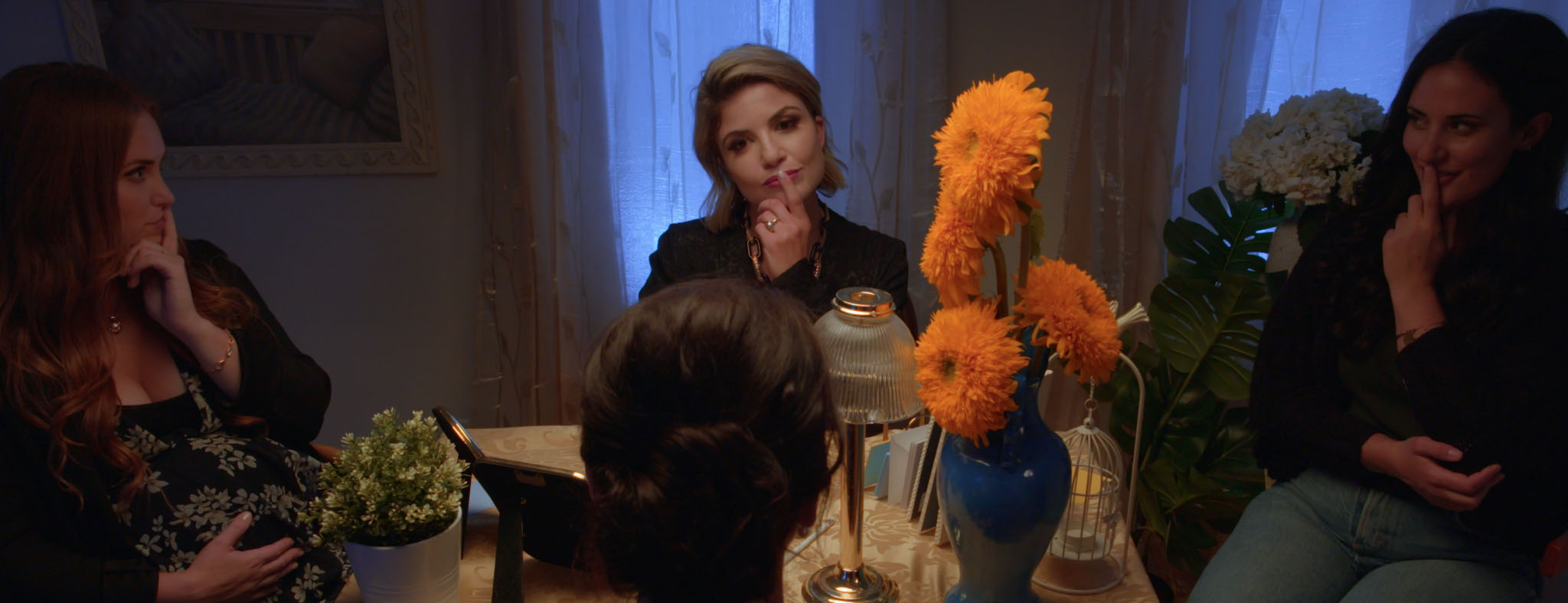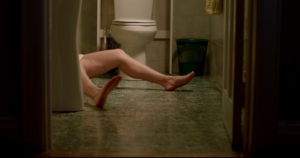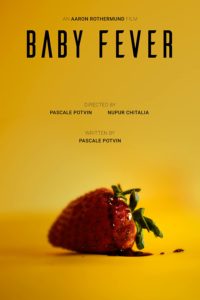
According to her website, Pascale Potvin currently holds staff positions at eight literary magazines and journals, including the role of editor-in-chief at Wrongdoing Magazine. She is a Pushcart Prize and Best Microfiction nominee and, under the name Palaces, publishes chapbooks of poetry and creative nonfiction. She has previously worked on the award-winning short film Beat, and has now written and co-directed her debut horror feature, Baby Fever. When I saw on Twitter that Pascale was looking to be interviewed about the film, I jumped at the opportunity. Happily, she agreed, and I am now thrilled to share the interview here.

Pascale Potvin
IR: First of all, thank you so much for taking the time to speak with me today. I hope you are doing well!
PP: Thank you so much again for having me. I really appreciate your interest in the film.
IR: What drew you to the horror genre originally? Were you a fan of the genre as a child, or did something later in life pique your interest? What would you say are the main films or books, etc., that epitomise your taste in horror?
PP: I hated horror until about five years ago, I think. I didn’t get it; I thought it was some masochistic thing. I couldn’t stand to see any blood on screen (especially as a child, as you’d expect). But you know how once you finally force yourself onto that awful roller coaster, and the rest becomes harmless fun? I guess I popped my horror cherry as one does when they become an adult.
My favourite horror films right now are The Wicker Man (1973) and Swallow (2019). I watched so many in preparation for Baby Fever and those stand out the most in my mind.
IR: Horror has long focused on women’s stories and voices. Not only were many of the classic horror authors women, so were their readers, especially in the Gothic tradition. Feminist themes are often centred in these narratives. Why do you think horror in particular is suited to telling these stories?
PP: Women have traditionally been victims of real-life horror, and so it makes sense that we’d turn to horror fiction for catharsis. Safe danger is a way of exploring the big scary feelings—the ones we usually ignore for our own sanities—while maintaining a sense of control. It’s even quite healthy, in my opinion. It stretches the mind. Really, it should be no surprise to anyone that so much horror is made by and for women.

Still from Baby Fever
IR: Your newest venture is a horror feature called Baby Fever. Could you give us an idea of what the film is about, as well as why you decided to write it?
PP: Baby Fever is based on my first real short story (also the first thing I ever published). Without giving too much away, it features a woman who suffers from an ectopic pregnancy shortly after joining a prestigious mothers’ association.
I wrote it because I was working as the social media manager for a brand aimed at mothers. I was having to constantly find and create content ‘relatable’ to them as a 20-year-old with absolutely no idea what I was talking about. It made me start thinking about how fake such cultures can be.
I also wanted to expand it into a screenplay because it was the only story of mine I could see enhanced and deepened by visuals.
IR: Watching the teaser, I was reminded in part of Rosemary’s Baby and The Stepford Wives, both of which were originally novels by Ira Levin. Was Levin’s work an inspiration to you, or were the film adaptations (iconic in their own right, of course) the real draw? What else – horror or otherwise – influenced the film?
PP: Levin was 100% an inspiration. Rosemary’s Baby is a direct reference within Baby Fever. Certain visuals from the film adaption are also a more subtle influence.
Other big horror influences are films like Get Out (2017) and Midsommar (2018), more recent cultural phenomena which I think will shape audience understanding of our film.

Still from Baby Fever
IR: Not only did you write the screenplay, you also worked as co-director. How did you approach writing the film versus directing it?
PP: I knew from the start I’d be directing, and so it was always more of a thorough director’s script. That being said, a huge part of directing is hiring crew and talent who will not only understand and work for your vision, but greatly enhance it. And especially because we only had 7 days to shoot this feature, I had to be much more flexible and collaborative as soon as I removed myself from the page.
IR: You co-directed the film with Nupur Chitalia. How did she come on board, and how was the experience sharing the role with a partner?
PP: I met Nupur upon starring in a short film she was producing. It was immediately so clear how hard she worked, and ultimately I couldn’t have asked for a better co-director. She cared so much about the story, and she put so much time into it.
Since she had more experience in talking to crew, and myself more comfortable with actors, it was also great to able to split up and maximize our efficiency (because, yeah, again, we only had 7 days.)

Still from Baby Fever
IR: Finishing a feature film is a huge achievement, so congratulations for that! When did you first decide that filmmaking was a path you wanted to follow? Who are your greatest filmmaking inspirations?
PP: I’ve always wanted to be a screenwriter. I had no idea I would end up directing—probably because I’m a woman, and I was involuntarily putting those restrictions on myself. For that reason, I’m most inspired and encouraged by any and all female directors. This includes any future or aspiring ones who might be reading this.
IR: Changing the subject slightly, as an admirer of Wrongdoing Magazine, I wondered if you could tell us a little about that. What made you decide to become the editor-in-chief of a magazine?
PP: I’ve thought about running a magazine—any kind, not just literary—since I was kid. It just always appealed to me. In 2020, I was so excited to be welcomed onto the staff of a few small litmags, and after gaining a bit of experience with them I knew I still wasn’t completely satisfied (despite loving them and my fellow staff so, so much). As I did with Baby Fever, I just had to execute my personal vision, if that makes sense.
IR: Where do you go from here? Can you let us know about any current or future projects we can look forward to?
PP: If you’re interested in Baby Fever, I highly encourage you to pressure publishers into accepting DEMONDUST, my first full-length collection—it includes the original story alongside many, many other uniquely-packaged psychological terrors.
Of course, this also includes many other opportunities for adaptation…

Baby Fever poster
Thank you to Pascale for taking the time to be interviewed. The teaser for Baby Fever went live at 5pm GMT on Tuesday 11th January, alongside the Indiegogo campaign to cover post-production costs. If you’d like to learn more about Pascale, you can follow her @pascalepalaces on Twitter.
More Interviews
Todd Keisling was born and raised in a small town in rural Kentucky; those of you who’ve read Devil’s Creek were treated to a dark mirror image of the town… Born in Houston, Texas, Teri McMinn is an American actress most notable for her role as Pam in Tobe Hooper’s exploitation slasher The Texas Chain Saw Massacre (1974). When Hooper… The Grimoire of Horror is proud to present our first foray into video content with an interview with director Matthew John Lawrence and actor David Littleton of the punk rock… Thomas Burke is an award-winning filmmaker and editor based out of Austin, Texas. He has spent over the last decade freelancing in various production roles including film directing, acting, producing…God, the Devil, and Rock: An Interview with Todd Keisling
An Interview with Teri McMinn – The Texas Chain Saw Massacre (1974)
Interview with Matthew John Lawrence and David Littleton of Uncle Peckerhead [Video Content]
Interview with Director/Editor Thomas Burke – Found Footage Aficionado
Isabelle is a writer from the UK who enjoys alternative manga and horror films. When not writing, you can probably find Isabelle buying books or obsessing over Martin and Lewis.


![Interview with Matthew John Lawrence and David Littleton of Uncle Peckerhead [Video Content]](https://www.grimoireofhorror.com/wp-content/uploads/2021/03/uncle-peckerhead-review-365x180.png)
